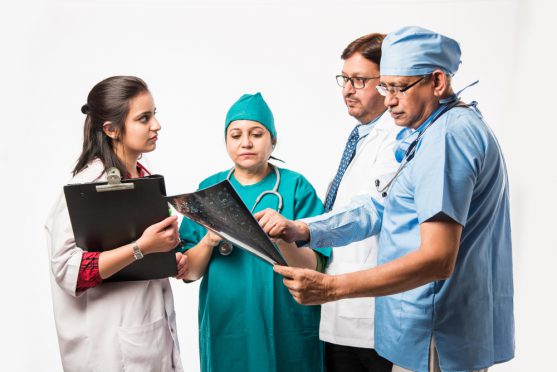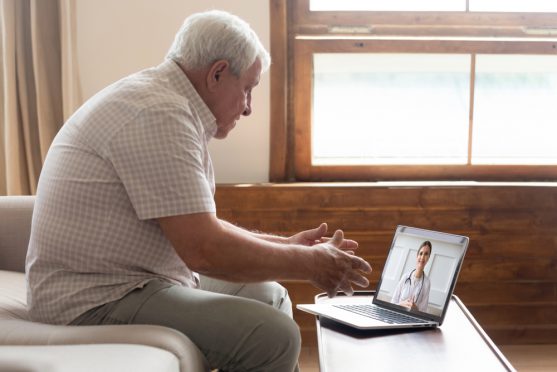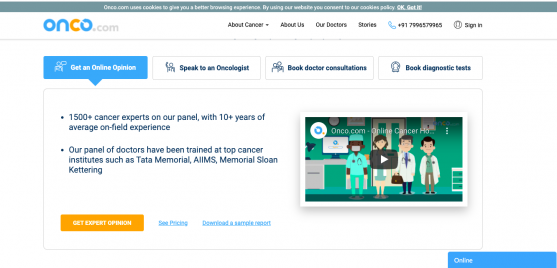Being diagnosed with cancer brings with it a wide range of emotions, and is often overwhelming. This is followed by a sense of urgency to begin the treatment as soon as possible.
Many times, during the process of diagnosis and treatment, you become unsure of whether things are going as they should, or if there is a better way to do it.

The ‘belief’ that you are receiving the best diagnosis and treatment, is an extremely important component of cancer care. To find this ‘trust’ in a situation of life and death like cancer, it is always a good idea to get another expert look at the diagnosis and treatment plan with a fresh perspective. This is called a second opinion, and is a common practice in medicine.
A second opinion means reaching out to another oncologist after the initial diagnosis, to ensure that the diagnosis was accurate, and the treatment plans are consistent with the current standard of care.
The second oncologist or a panel of oncologists will then provide their view on your diagnosis or treatment, which may or may not be similar to what the first oncologist recommended and this helps you participate in the treatment decisions and ensure best treatment outcomes. Many times, doctors themselves encourage their patients to seek a second opinion to feel more confident about their health care choices.
Why get a second opinion?
Seeking a second opinion is your right as a patient. One should not worry about, or shy away from getting another opinion on your treatment plan as the stakes are quite high and it always helps to be doubly sure. It is also important that the 2nd opinion must be taken from a qualified expert or a panel of multidisciplinary expert oncologists to get the most scientific opinion.
You may want to seek a second opinion for the following reasons:
- You want to confirm your diagnosis.
- Your doctor is uncertain about the type or stage of cancer you have.
- You want to ensure that you are receiving the best treatment.
- You want to explore any advanced treatment options available to you.
- You want to explore an alternative treatment.
- You have received different recommendations to treat your cancer, and you are not able to decide which one to go for.
- You are not comfortable with your current treatment plan.
- You don’t understand what your doctor is saying.
- You have been diagnosed with a rare type of cancer.
- Your doctor does not have experience in treating your type of cancer.
- Your insurance company asks you to get another opinion before the treatment.
When is the best time to get a second opinion?
You can get a second opinion at any time during the cancer care process; before chemotherapy, surgery or radiation. However, it is a good idea to go for the second opinion immediately after the diagnosis and before starting any treatment. This is because a second opinion can provide new information regarding the diagnosis, suggest other treatment options, and can change the course of your treatment.
You may need about a few days to get a second opinion. Usually, this delay will not affect your treatment, but to be sure, verify with your doctor if it is alright to delay the treatment till you can get another opinion. A more scientific and informed treatment plan is worth a delay of a few days as it ensures you have best chances of recovery from cancer.
How to talk to your doctor about a second opinion?
Most doctors are not offended when you inform them that you want to go for a second opinion. Some doctors even refer their patients to other doctors. Thus, you don’t need to feel awkward about asking for a second opinion.
It is important to talk to your doctor about your second opinion, as you will need the medical test results and records to get the second opinion. Moreover, communicating openly will help you have a good relationship with your doctor.

You want to be polite and civil while talking about second opinions. If you don’t know how to start the conversation, these sentences may help:
- “I respect your opinion, but I would like to talk to another doctor so that I am more confident about our treatment plan. How can I proceed?”
- “Before we start treatment, I’d like to get a second opinion. Will you help me with that?”
- “This new information is overwhelming for me; I feel that a second opinion could give me clarity and confidence.”
- “I think I’d like to talk with another doctor to be sure I have all my bases covered.”
- “Do you know another doctor who has expertise in my type of cancer?”
How do I find another cancer expert for the second opinion?
Often your doctor can refer you to another doctor who specializes in or has experience in treating your condition.
You can always reach out to your friends and family who have been treated for cancer to see if they can recommend a doctor.
There are several resources available online where you can find another doctor. Some of the other possible resources for finding an oncologist include local hospitals, medical clinics or cancer centers, medical associations that provide searchable databases of doctors, and cancer organizations and patient advocate groups.
Onco.com has a second opinion service which allows you to find an oncologist with experience in your type and stage of cancer. The second opinion can be provided by a single oncologist or a panel of experts.
The second opinion report contains detailed information on the best treatment plan to follow, along with an explanation of the possible outcomes from your treatment.
How do I prepare for a second opinion?
To prepare for your second appointment, you should consider what you want from the second opinion. You can note down the symptoms and treatments that you have already received and any other questions you may want to ask.
Ask a friend or a family member to go with you for moral support; they can help you remember what the doctor said and write down notes for you.
Make sure you gather all the relevant medical records, such as blood reports, scan reports, etc. This will prevent repeat testing. The following information should be kept handy:
- A copy of pathology reports from any biopsy or surgery
- If you had surgery, a copy of your operative report
- If you were admitted in a hospital, a copy of the discharge summary
- A summary of your doctor’s current treatment plan
- List of all the drugs, their doses and when you took them
You can ask your doctor’s office for copies of your medical records.
Also, verify with your insurance provider whether your policy covers a second opinion for your cancer. Ask if you are required to select from a certain group of doctors.
What is the process of a second opinion?
A second opinion involves a multidisciplinary team that reviews all the data independently. During a second opinion, your blood reports, scan reports, biopsy test results, etc. are reviewed. This could lead to a change in the diagnosis, and thereby the treatment recommended.

Today, there are various online platforms which allow you to seek a second opinion from an expert or a team of experts that constitute a tumor board. You can get this second opinion from the comfort of your home.
You can upload your medical information, test results, imaging scans and medical records on the platform. The tumor board consisting of the multidisciplinary experts will help you with treatment decisions and provide the best treatment plan suited for your case.
You can out forth any other queries to the team of experts and make a note of the information provided.
The platform may also allow you to search for specialist doctors on the platform and help you connect with them for your treatment.
You can write down the information provided by the doctor, or even record your calls with the permission of the doctor.
To make the best out of the second opinion, you can plan and prepare a list of questions you wish to ask your doctor or the team. Here are some examples of what you can ask:
- Is my initial diagnosis accurate?
- What are my treatment options?
- What are the side effects of these treatments?
- What impact will these treatments have on my life?
- How long will the treatment take?
- What is the best possible outcome for my case?
- Will I need to have my treatment at another hospital?
- Am I eligible for a clinical trial?
Is it really worth getting a second opinion?
Although second opinions require some extra work and coordination, they really are worth the effort. Second opinions provide access to additional information and resources.
They usually help relieve any anxiety you are facing over your treatment and clarify the treatment plan to you. They give you the assurance you need that your care is on the right path.
You may also come across treatment options that may not have been offered or discussed previously . For these reasons, a second opinion will help you choose the best treatment for your cancer.
How does a second opinion help in my cancer treatment?
- A second opinion would help you confirm your initial diagnosis.
- It allows you to seek the advice from experts in different fields of oncology, such as radiation oncology, medical oncology, surgical oncology, etc.
- It might provide additional information regarding your case, help you understand the precise location of the cancer, the extent of spread of the cancer, and its impact on other parts of the body.
- If the second opinion disagrees with the initial diagnosis or the proposed treatment plan, it may provide other treatment options, including alternative therapies and clinical trials.
Research shows that most second opinions validated the initial diagnosis, but it also changed the overall diagnosis, management or prognosis in most cases.
What to do if the second opinion differs from the first?
There are good chances that the second opinion will be similar to that of the first one. If so, you can be more confident about the diagnosis and the treatment plan.
If the second opinion differs from the first one, you need not worry. Talk to your first doctor and briefly discuss this new information.

If possible, both the doctors can come together and discuss how they interpreted the test results, how they arrived at the treatment plan, and what research studies or professional guidelines they consulted. Then, you can decide how you would like to proceed with your treatment.
If you are still unsure, you have the option of consulting a third doctor, who can help you decide which of the two options is the best for you.
However, remember that, despite a second or third consultation, you need not switch your doctor. You can decide which doctor to continue your treatment with.
Benefits of a Second Opinion
The benefits of seeking a second opinion include these:
- If the doctors agree on your initial diagnosis and treatment, you feel reassured and confident.
- You may get along better with the second doctor and have more confidence in what they say.
- Your second doctor may offer a different treatment or a clinical trial, allowing you to choose the treatment you are comfortable with.
Seeking second opinions is usually encouraged, especially for cancer patients.
By consulting another doctor, you are exercising your right as a patient, and acquiring more knowledge and better understanding about your condition. This would eventually help you to make an informed decision to improve your health and quality of life.


